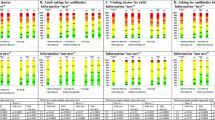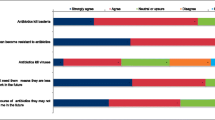Abstract
Many doctors prescribe antibiotics for a cold, to meet patient’s expectations. As a result, patient’s education about antibiotics and antibiotic resistance forms a major component of the WHO’s Global Action Plan on Antimicrobial Resistance. However, it is not known whether simple educational material can change a person’s attitudes about antibiotic therapy. We designed three posters about antibiotic treatment for “cold and flu”. Hospital inpatients answered a baseline survey and then were asked to look at one of three randomly selected posters. The posters highlighted the futility of antibiotic treatment for colds (futility), the risk of adverse drug reactions from antibiotics (harm), and the issue of antimicrobial resistance (resistance). Participants then completed a follow-up survey. Participants’ expectations to receive antibiotics for a “bad cold” reduced significantly after viewing a poster (82/299, 27% expected antibiotics in the baseline survey compared with 13% in the follow-up survey, P < 0.01). Continuing expectation to receive antibiotics after viewing one of the posters was associated with expectation to receive antibiotics in the baseline survey and the strong belief that colds were caused by bacteria. Participants who viewed the resistance poster were more likely to continue to expect antibiotics than participants who viewed the futility poster (OR 2.46, 95%CI 1.16–5.20, P = 0.02). Following discussion of the study, viewing a poster reduced participants’ expectations to receive antibiotics for a hypothetical cold. Changing patients’ expectations to receive antibiotics using simple educational material about antibiotic futility could lead to significant reductions in antibiotic prescription for viral upper respiratory tract infections.

Similar content being viewed by others
References
Aikman KL, Hobbs MR, Ticehurst R, Karmakar GC, Wilsher ML, Thomas MG (2013) Adherence to guidelines for treating community-acquired pneumonia at a New Zealand hospital. J Pharm Pract Res 43(4):272–275. https://doi.org/10.1002/j.2055-2335.2013.tb00273.x
McGregor A, Dovey S, Tilyard M (1995) Antibiotic use in upper respiratory tract infections in New Zealand. Fam Pract 12(2):166–170
Williamson DA, Roos RF, Verrall A (2016) Antibiotic consumption in New Zealand, 2006–2014
Duffy E, Ritchie S, Metcalfe S, Van Bakel B, Thomas MG (2018) Antibacterials dispensed in the community comprise 85%–95% of total human antibacterial consumption. Journal of Clinical Pharmacy and Therapeutics 43(1):59–64. https://doi.org/10.1111/jcpt.12610
Gulliford MC, Moore MV, Little P, Hay AD, Fox R, Prevost AT, Juszczyk D, Charlton J, Ashworth M (2016) Safety of reduced antibiotic prescribing for self limiting respiratory tract infections in primary care: cohort study using electronic health records. BMJ 354. https://doi.org/10.1136/bmj.i3410
Fletcher-Lartey S, Yee M, Gaarslev C, Khan R (2016) Why do general practitioners prescribe antibiotics for upper respiratory tract infections to meet patient expectations: a mixed methods study. BMJ Open 6(10). https://doi.org/10.1136/bmjopen-2016-012244
Dempsey PP, Businger AC, Whaley LE, Gagne JJ, Linder JA (2014) Primary care clinicians’ perceptions about antibiotic prescribing for acute bronchitis: a qualitative study. BMC Fam Pract 15(1):194
Coenen S, Francis N, Kelly M, Hood K, Nuttall J, Little P, Verheij TJM, Melbye H, Goossens H, Butler CC, on behalf of the GPG (2013) Are patient views about antibiotics related to clinician perceptions, management and outcome? A multi-country study in outpatients with acute cough. PLoS One 8(10):e76691. https://doi.org/10.1371/journal.pone.0076691
Ritchie SR, Jayanatha KJ, Duffy EJ, Chancellor J, Allport Z, Thomas MG (2017) Previous antibiotic-related adverse drug reactions do not reduce expectations for antibiotic treatment of upper respiratory tract infections. J Glob Antimicrob Resist 10:256–260. https://doi.org/10.1016/j.jgar.2017.05.020
Ministry of Health, Ministry for Primary Industries (2017) New Zealand Antimicrobial Resistance Action Plan
World Health Organisation (2015) Global action plan on antimicrobial resistance
Sabuncu E, David J, Bernède-Bauduin C, Pépin S, Leroy M, Boëlle P-Y, Watier L, Guillemot D (2009) Significant reduction of antibiotic use in the community after a nationwide campaign in France, 2002–2007. PLoS Med 6(6):e1000084. https://doi.org/10.1371/journal.pmed.1000084
Bauraind I, Lopez-Lozano J-M, Beyaert A, Marchal J-L, Seys B, Yane F, Hendrickx E, Goossens H, Tulkens PM, Verbist L (2004) Association between antibiotic sales and public campaigns for their appropriate use. JAMA 292(20):2465–2470. https://doi.org/10.1001/jama.292.20.2468-b
McNulty CAM, Nichols T, Boyle PJ, Woodhead M, Davey P (2010) The English antibiotic awareness campaigns: did they change the public's knowledge of and attitudes to antibiotic use? J Antimicrob Chemother 65(7):1526–1533. https://doi.org/10.1093/jac/dkq126
Broniatowski DA, Klein EY, Reyna VF (2015) Germs are germs, and why not take a risk? Patients’ expectations for prescribing antibiotics in an inner-city emergency department. Med Decis Mak 35(1):60–67. https://doi.org/10.1177/0272989x14553472
Linder JA (2008) Antibiotics for acute respiratory infections: shrinking benefit, increasing risk, and the irrelevance of antimicrobial resistance. Clin Infect Dis 47(6):744–746. https://doi.org/10.1086/591149
Ejemot-Nwadiaro RI, Ehiri JE, Arikpo D, Meremikwu MM, Critchley JA (2015) Hand washing promotion for preventing diarrhoea. Cochrane Database Syst Rev 9. https://doi.org/10.1002/14651858.CD004265.pub3
Funding
The A+ Trust, Auckland District Health Board provided support in the form of a summer studentship (LR).
Author information
Authors and Affiliations
Corresponding author
Ethics declarations
Ethical approval for this study (16/NTB/187) was provided by the Health and Disability Ethics Committee of the New Zealand Ministry of Health.
Additional information
Publisher’s note
Springer Nature remains neutral with regard to jurisdictional claims in published maps and institutional affiliations.
Electronic supplementary material
ESM 1
(DOCX 1682 kb)
Rights and permissions
About this article
Cite this article
Ritchie, S.R., Rakhmanova, L., Out-O’Reilly, E. et al. The use of a poster to reduce expectations to receive antibiotics for a common cold. Eur J Clin Microbiol Infect Dis 38, 1463–1469 (2019). https://doi.org/10.1007/s10096-019-03572-5
Received:
Accepted:
Published:
Issue Date:
DOI: https://doi.org/10.1007/s10096-019-03572-5




